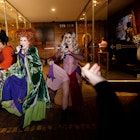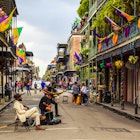
Learn more about legendary pianist Professor Longhair at this new exhibition in Baton Rouge
Apr 8, 2022 • 2 min read

One of the seminal New Orleans jazz musicians, Professor Longhair's work also inspired countless other American musicians © David Redfern / Getty Images
On April 19th the Capitol Park Museum in Baton Rouge will open a new exhibition celebrating the life and musical legacy of one of Louisiana’s most influential musicians, legendary piano player Henry Roeland Byrd, popularly known as Professor Longhair.
Me Got Fiyo: The Professor Longhair Centennial shares with visitors is a tribute to a man who not only shaped the landscape not just of New Orleans music, but of the American music as a whole.

Who was Professor Longhair?
According to David Kunian, Music Curator at both the Louisiana State Museum and the New Orleans Jazz Museum: “Professor Longhair is one of the seminal music figures, certainly in New Orleans, but really in American music and rock and roll in general.”
“Fess” as he was sometimes called locally, was born in 1918 in Washington Parish, Louisiana. Obsessed with music since childhood, legend has it that his distinctive style of piano came about as the result of learning to play on an instrument that was missing several keys.
Though he had one national hit in 1950, called "Big Head," he's better known for classic New Orleans song's such as 'Go to the Mardi Gras,' 'Big Chief' and 'Tipitina.'
Me Got Fiyo: The Professor Longhair exhibition
Me Got Fiyo uses a collection of artifacts to tell Professor Longhair’s story, including artwork, photographs and even a 3-D recreation of a life-sized bust of the musician. The original is located at the entrance to Tipitina’s the music club made famous by Fess’ hit song of the same name.
“You can’t play New Orleans piano, really New Orleans music…without having him figure in, in some way,” Kunian says. “The way he combined Caribbean rhythms, really driving piano style and also the slightly nonsense, slightly obscure lyrics. You can’t escape him and play any kind of music around here.”
The exhibition runs from April 19 to August 6 at the Capitol Park Museum. Entrance is $7 for adults, $6 for students, senior citizens, and members of the military with ID and free for children 6 and under. There are also several other accompanying programs at the museum, including a "Women in the Blues" panel discussion on April 21 that runs from 5:30 to 7:00 p.m.
You might also like
A taste of Louisiana: signature dishes of the Bayou State
5 cool and unusual things to do in Louisiana
Louisiana’s live music scene
Explore related stories

Wildlife & Nature
Day trips from New Orleans: 9 can't-miss jaunts from The Big EasyNov 21, 2024 • 6 min read



 ArchitectureGet spooked this season at the 14 most haunted places in America
ArchitectureGet spooked this season at the 14 most haunted places in AmericaSep 9, 2024 • 5 min read





